HARTFORD – The room was full of Hartford residents for a mayoral forum Tuesday at Capital Community College during which topics of housing, leadership, education, economic development, employment and police accountability took center stage.
Held by the Greater Hartford NAACP and the Greater Hartford National Pan-Hellenic Council, the event featured six mayoral candidates. Moderator and former state Rep. Brandon McGee introduced each of the candidates, noting that one candidate, Tracy Funnye, was unable to attend.
Candidates present included retired judge and former state Sen. Eric Coleman, City Councilman Nick Lebron, Arunan Arulampalam, state Sen. John Fonfera,
and community leaders Renardo Dunn and Giselle Jacobs.
Housing
McGee asked the candidates how they would engage code enforcement to ensure compliance with housing and building codes on behalf of city residents, as about three fourths of all Hartford residents are tenants.
Arulampalam noted that while he was with the state Department of Consumer Protection they initiated a lawsuit that was the first of its kind in the nation against a landlord and during the case he heard a disturbing story of a young child having PTSD, because they woke up at night to rats biting their face.
The story, he said, is an example of why cities needs to go after landlords who do not comply with housing codes and increase the number of housing inspectors.
“We need to make an example out of the biggest ones. We’ve got to be strategic. We’ve got to figure out who are those large scale landlords, hiding behind LLC shell structures and owning a ton of property. Our city with large housing violations, hit them everywhere they are,” Arulampalam said.
Administration
Candidates also spoke of tangible things Hartford residents would see under their leadership.
Dunn said that his first priority would be to put residents first.
“As I drive around Hartford, I see so much garbage, so much trash. When you go to certain neighborhoods, you don’t see that,” he said. “So under my watch, we will clean up Hartford in a tremendous way. We keep building all these different buildings, but then, they get messed up [again].”
Fonfera said that under his administration, a Department of Education would be at City Hall, as this would reflect how important education is to the city, along with a commitment to resources targeting poverty and low opportunity neighborhoods.
“That will mean children feeling good about the opportunities, the options, and their confidence in education,” he said, noting he also would seek resources from the state to target high poverty, low opportunity neighborhoods with job training, and programs that would give people greater greater opportunities to purchase a home and “enjoy the life that the majority of people in our state now enjoy.”
Coleman said he hopes to continue work he accomplished as a state senator, along with bringing commercial corridors in the city, similar to Blue Back Square in West Hartford, and doing what he can to eliminate the gun violence in the city – as he is tired of seeing and hearing about young people shooting young people in the streets.
Lebron said that in order to make innovative and sustainable change, he plans to work to give Hartford residents access to government in all areas.
“The first tangible thing you would see is at City Hall. We need to get back to the relationship with our residents. Far too often, we rely on social media and websites for the answers to our questions. We need to provide access to opportunities,” he said.
Arulampalam said that he agrees with Dunn that the trash on the streets needs to be addressed and wants to invest in people dedicated to picking up the big stuff that gets left behind, such as mattresses and couches.
However, he said that the bigger thing that he would focus on is real investment in the neighborhoods and Hartford resident owned housing and small businesses.
Jacobs said tangible evidence of a changed Hartford would be community members knowing their neighbors, elected officials being visible beyond election season, households having educational books in homes for young people to learn beyond the school day, and school cafeterias serving healthful meals to students.
McGee also asked the candidates a question from an audience member about priorities for the absence of three elementary schools in the North End community, Clark Elementary School, Simpson-Waverly Elementary School, and Wish Elementary School.
Many of the candidates attended these schools before they were closed down.
Lebron said that he would need the community’s support to help him bring these schools back.
Fonfera said that when he was growing up in Harford, there were three high schools and “having children growing up in one neighborhood, but going to school in another part of town or another town, takes away the community effect.”
Dunn said looking at the schools would be his first priority, as the youth are important to him.
“Our youth [are] our today. So we need to invest in our youth. I will look into see what needs to be done so that we can reopen these schools, so that we can have our kids going to school in their community versus walking almost two blocks, just to go to another school, when we have multiple schools,” he said.
Coleman said that he also believes in making this issue a priority, as he is troubled by the closings.
Jacobs said that she is distraught over all the closing of the schools, as she recalls having culturally competent teachers who were also Black, while a student of Sand Elementary.
Caption: Mayoral candidate and state Sen. John Fonfera speaks to community members during the second mayoral forum, held at Capital Community College. Deidre Montague/Hartford Courant
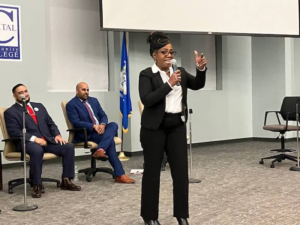
Mayoral Candidate Giselle Jacobs – (Deidre-Montague)
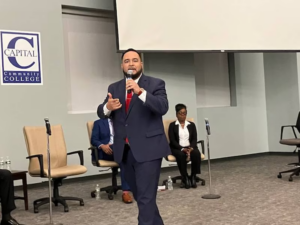
Mayoral Candidate and City Councilman Nick Lebron – (Deidre Montague)
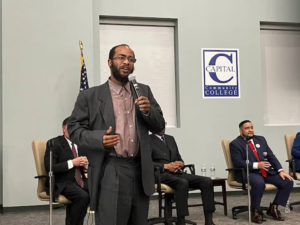
Mayoral Candidate Renardo Dunn – (Deidre-Montague)
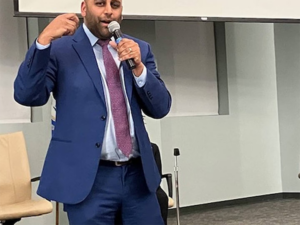
Mayoral Candidate Arunan Arulampalam – (Deidre Montague)
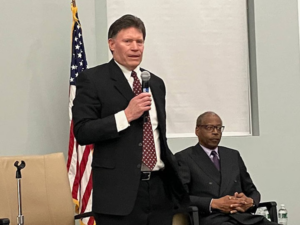
Mayoral Candidate and State Sen. John Fonfara – (Deidre Montague)
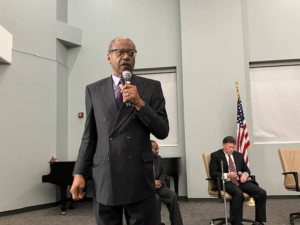
Mayoral Candidate Eric Coleman – (Deidre-Montague)
